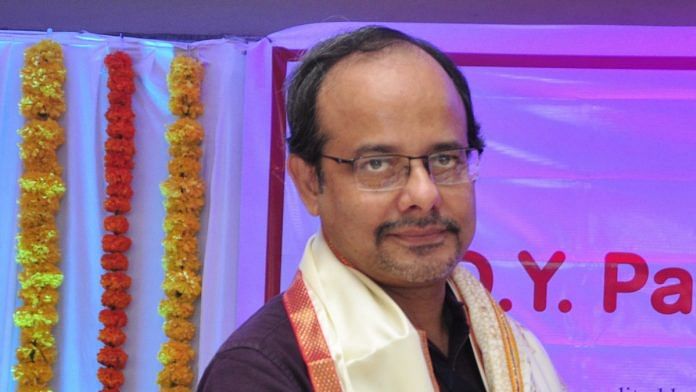
New Delhi: Considerations for decision-making differ during “extraordinary times” such as the Covid-19 pandemic, said Dr Samiran Panda, a top scientist from the Indian Council of Medical Research (ICMR), on the clearance granted to Bharat Biotech’s Covaxin — India’s indigenous Covid vaccine.
Covaxin, developed by Bharat Biotech and the ICMR, received a “conditional nod” by the Drug Controller General of India (DCGI) on 3 January, despite no efficacy data and incomplete Phase 3 trial data.
In an interview to ThePrint, Panda, head of the epidemiology and communicable diseases division at ICMR, said, “Considerations for accelerated approval of a vaccine in pandemic-time demand a different level of ability to bring various pieces of evidence on the table and make a sense out of it.”
He added: “Requirements also differ with regard to evidence for decision-making during extraordinary time vis-a-vis business as usual.”
“The provisions in the New Drugs and Clinical Trial Rules published on 19 March 2019 allowed for such innovation,” said Panda.
What is ‘clinical trial mode’?
While giving the ‘conditional nod’ to Covaxin, DCGI’s Dr V.G. Somani had said, “The Subject Expert Committee (SEC) has reviewed the data on safety and immunogenicity of the vaccine and recommended for grant of permission for restricted use in emergency situation in public interest as an abundant precaution, in clinical trial mode, to have more options for vaccinations, especially in case of infection by mutant strains.”
However, several public health experts have raised questions about the meaning of the phrase ‘clinical trial mode’.
According to Dr Panda, who is also the director of ICMR’s National AIDS Research Institute (NARI), which executed the World Health Organisation’s Solidarity Trial in India, restricted use in emergency situations will observe rigorousness that is similar to clinical trials
“This will entail informing a potential vaccine-recipient in detail about the vaccine, obtaining consent before vaccine administration, monitoring adverse events for a longer period of time as well as ensuring due support to the individuals encountering adverse events etc,” he said.
It is worth noticing, he said, that “the Phase-III clinical trial with the same vaccine will concurrently continue and interim analysis as well as end-of-trial analysis of this phase will inform future decisions pertaining to the restricted use”.
‘Public data fosters trust’
Panda further reiterated that early phase results of Covaxin are available in the public domain for anyone to examine.
When asked if ICMR plans to publish the data used for the approval, Panda said, “In line with the principles of open and transparent practice, ICMR puts its research findings in the form of pre-prints and will continue to do so.”
He also agreed that publishing data in the public domain builds trust among the community and encourages people to take vaccination shots.
“Explaining science to the people on the street and explaining scientific issues and findings in an easy language is of utmost importance as public health is about people,” the ICMR scientist told ThePrint.
“It is therefore imperative that people remain at the centre of and remain engaged in all public health discussions. Science should be practiced transparently, discussed loudly and disseminated widely,” he added.
‘Covid vaccine bouquet welcome situation in India’
India has already approved two vaccine candidates, Covaxin and Serum Institute of India’s Covishield. However, there are several other vaccine options available in the country that are awaiting approval and trial completion — the ZyCoV-D manufactured by Zydus Cadila, Russia’s Sputnik V that is being manufactured by Dr. Reddy’s Laboratories, SII’s NVX-CoV2373, a recombinant protein antigen-based product by the company Biological E and an mRNA-based vaccine by Gennova Biopharmaceuticals.
According to Dr Panda, multiple Covid vaccine options reflect a “welcome situation for any country”.
“The more arsenals we get in our stock against an organism, the merrier – particularly when a microorganism appears as a new threat to humankind and infects a large number of individuals within a short period of time,” he said.
However, Panda said, analysing the bouquet of vaccines and understanding what India needs is key.
“From a public health perspective, one needs to also consider the utility of a particular vaccine in a specific country-context as well as in terms storage, distribution, and administration logistic requirements,” he said.
He added that India’s edge throughout the pandemic has been its “proactive leadership in implementing evidence-based public health measures, committed and very well-trained scientists as well as the ability to innovate in a trying time.”
Subscribe to our channels on YouTube & Telegram
Why news media is in crisis & How you can fix it
India needs free, fair, non-hyphenated and questioning journalism even more as it faces multiple crises.
But the news media is in a crisis of its own. There have been brutal layoffs and pay-cuts. The best of journalism is shrinking, yielding to crude prime-time spectacle.
ThePrint has the finest young reporters, columnists and editors working for it. Sustaining journalism of this quality needs smart and thinking people like you to pay for it. Whether you live in India or overseas, you can do it here.